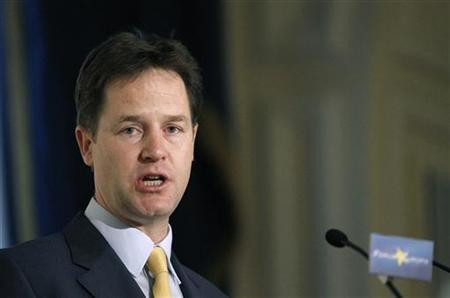Nick Clegg needs a miracle to prevent another period of irrelevance for the Lib Dems

Despite their protests to the contrary, it is well known that politicians spend a good deal of time looking at opinion polls before elections. For Nick Clegg though, leader of the Liberal Democrats and now Deputy Prime Minister, he would do well to look at the polls immediately after the election if he wants the best for his party.
The introduction of televised debates between the leaders of the three largest parties appeared to be a "game changer" during the recent general election. By giving Mr Clegg an equal platform with the then Prime Minister Gordon Brown and Tory leader David Cameron, both Labour and the Conservatives were seen to have made one of the biggest blunders of the campaign.
Mr Clegg's performance in the first of the three debates led to a surge of support for the Lib Dems in the polls, driven mainly by the fact that he was young, was neither Mr Brown nor Mr Cameron and had apparently not been heard of before.
This "Cleggmania" led to the Lib Dems poll rating rising from an average of around 20 per cent to the high twenties to the low thirties. As the campaign continued the Liberals looked like they were battling for second place with Labour, being roughly equal in the polls.
Although their support in the polls appeared to be dipping slowly, the Lib Dems, like the SDP before them, looked like they could make a real breakthrough, if not in seats than it least in votes. But, like the SDP before them such a breakthrough failed to materialise.
The Lib Dems saw their share of the vote rise by just one per cent to 23 per cent (6.8 million votes), while in terms of seats the party actually made a net loss of five seats, two of whom were (relatively) high profile Lib Dem MPs Lembit Opik and Evan Harris.
Despite this lack of a breakthrough, the Lib Dems were still in the high twenties in the polls up to the day of the election, more or less equal with Labour (who in the end got 29 per cent of the vote and 8.6 million votes).
But following their decision to enter coalition with the Tories the party saw its levels of support decline noticeably in the polls. Six polls conducted in May after the formation of the coalition government all put the Lib Dems back down to their old level of 21 per cent, while the a poll in June put them even lower at 18 per cent.
This decline could well be due to their role in keeping the Conservative Party comfortably in power. Many Lib Dem voters no doubt voted to "keep the Tories out" and some, although by no means all, were hoping for a coalition of the left with the Labour Party that would keep the Tories out for all time.
While some senior Lib Dems seem happy with their new positions in the cabinet and claim that their presence helps moderate the Tories who would otherwise unleash the forces of unrestrained conservatism on the nation, others, such as former Lib Dem leader Sir Menzies Campbell look less comfortable.
Sir Menzies has already said that he will vote against increasing student tuition fees, rather than just abstaining as is allowed for Lib Dems in the coalition agreement. The new deputy leader of the Lib Dems, Simon Hughes has also spoken of being a voice of opposition from inside the government.
By contrast the Conservative Party, despite significant concerns from its back benches and more traditional members, seems to have seen its levels of support remain unchanged and perhaps even rise.
Following the formation of the coalition government support for the Tories in the polls seemed to rise a little from 35-37 per cent to 37-39 per cent, while a poll in June puts them at 40 per cent, a figure which eluded them throughout the whole campaign, suggesting they have not suffered from the pact as the Lib Dems appear to have done.
The coalition is committed to holding a referendum on changing the voting system to AV+, which for the Lib Dems is meant to be the first step towards full proportional representation. However while the Tories have said they will support a referendum, they have also said they will campaign adopting AV+.
Even if AV+ was introduced for general elections the Lib Dems are going to have to perform something amazing in the current parliament if they want to make their much longed for breakthrough. At a time when the government is emphasising austerity and dark times ahead, the scope for a Lib Dem coup from within the government is extremely limited.
Mr Clegg may not have to worry about an election for another five years, but even so he should already be thinking about how to save his party from another long period of irrelevance, which is what they will face if their support has reverted to its usual levels, especially if the election is sooner than he thinks.
© Copyright IBTimes 2025. All rights reserved.





















